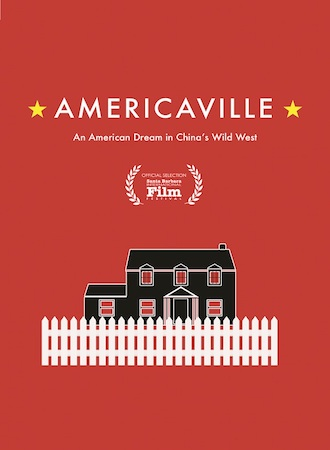
Americaville 2020
Distributed by The Video Project, 145 - 9th St., Suite 230, San Francisco, CA 94103; 800-475-2638
Produced by Adam James Smith
Directed by Adam James Smith
Streaming, 80 mins
High School - General Adult
American Studies; Chinese Studies; Replica Towns
Date Entered: 05/14/2021
Reviewed by Christopher Lewis, American University Library, American UniversityIn China, some entrepreneurial developers seem to have taken an unusual approach to cultural appropriation: they’re building replica towns based on American and European cities. One in particular, modeled on Jackson Hole, Wyoming, not only duplicates the architecture but is creating an unusual hybrid lifestyle that is based on the values of Hollywood Westerns and the amenities of affluent Western-themed subdivisions. This phenomenon is the primary focus of this documentary, specifically through the lens of one woman, Liu Hua, a homeowner in Jackson Hole who retreats to the faux-Western town on weekends after a work week in the crowded and polluted Beijing.
Liu Hua’s life in Jackson Hole is a fever dream of Americana kitsch. She has a framed Declaration of Independence and a presidential seal on the lid of her trashcan; she gets recipes and domestic tips from reprinted homemaking books; and for an American-themed party, she makes a hilariously messy concoction that consists of generic Froot Loops-like cereal, marshmallows, and butter. The town hosts Halloween, a cowboy flashdance, and barbecues. A group also gets together to make a movie loosely inspired by stories from American westerns that highlights the locations in Jackson Hole. There are aspects of the documentary that are very close to the fictional Westworld in that the residents seek an idealized lifestyle of simple wholesome values though without the robots and the gunfights.
It isn’t obvious why cowboys and the American West are the vision being sought after, but the documentary hints at the cultural politics happening here. There is a sense that for many Chinese citizens, who have lived in poverty for generations, there’s no existing culture of how to spend their newfound wealth, and they are looking elsewhere in the world for inspiration. One real estate salesperson in Jackson Hole suggests that the peak of American culture was when Ronald Reagan was president (!) and that he not only lived on a ranch, rode horses, and wore cowboy hats and boots, but he also acted in the movies that shaped the myths of the American West.
To be frank, the large-scale imitation of cultures depicted in this documentary is bizarre, and the film is engrossing because of that. In addition to Jackson Hole, one also gets a glimpse of a recently built neighboring development based on Beverly Hills and hears of plans for a Swiss village to be built with an accompanying vision of a neutral Euro lifestyle. It may make the viewer question their own fascination with lifestyles rooted in other cultures (e.g. feng shui, hygge, yoga).
There is no narration or talking heads to analyze the cultural significance of this phenomenon, though there are enough staged conversations directed at the camera to piece the story together. Yet there are subtle political insights — one may be surprised that a place that seems to fully embrace the Western mythos is allowed to even exist. It’s a highly entertaining and illuminating documentary and will be of broad general interest as well as specific to those interested in Chinese Studies, American Studies, and anthropology.
Awards:
Official Selection: SF Doc Fest, Santa Barbara International Film Festival, Salem Film Festival, Copenhagen Architecture Festival
Published and licensed under the Creative Commons Attribution 4.0 license. Anyone can use these reviews, so long as they comply with the terms of the license.